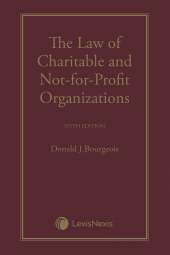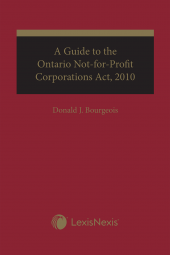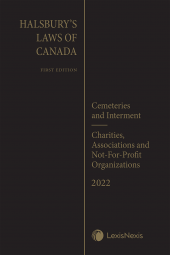The Law of Charitable and Not-for-Profit Organizations, 6th Edition
One Year Subscription Only Terms
Subscribers receive the product(s) listed on the Order Form and any Updates made available during the annual subscription period. Shipping and handling fees are not included in the annual price.
Subscribers are advised of the number of Updates that were made to the particular publication the prior year. The number of Updates may vary due to developments in the law and other publishing issues, but subscribers may use this as a rough estimate of future shipments. Subscribers may call Customer Support at 800-833-9844 for additional information.
Subscribers may cancel this subscription by: calling Customer Support at 800-833-9844; emailing customer.support@lexisnexis.com; or returning the invoice marked 'CANCEL'.
If subscribers cancel within 30 days after the product is ordered or received and return the product at their expense, then they will receive a full credit of the price for the annual subscription.
If subscribers cancel between 31 and 60 days after the invoice date and return the product at their expense, then they will receive a 5/6th credit of the price for the annual subscription. No credit will be given for cancellations more than 60 days after the invoice date. To receive any credit, subscriber must return all product(s) shipped during the year at their expense within the applicable cancellation period listed above.
Détails des produits
Click here for the student edition of The Law of Charitable and Not-for-Profit Organizations, 6th Edition.
Work effectively with and within a charity or NPO.
Charitable and not-for-profit organizations play an important role in Canada's economy, and in the lives of millions of Canadians involved in community efforts. In working inside or alongside these organizations, it is of immense benefit to have a good understanding of the laws governing them.
The Law of Charitable and Not-for-Profit Organizations is the leading legal reference text on the subject, providing an overview of the laws governing charitable and not-for-profit organizations, offering comprehensive analysis and advice in areas such as:
- Legal structure
- Governance and stewardship
- Charity members and their relationship with the organization
- Revenue, including fundraising, gifts, gaming, etc.
- Legal compliance with various statutes and taxation
What's New In This Edition
Author Donald J. Bourgeois is a top legal expert in the field, providing detailed information on charitable law, and offering exceptional insights and guidance. The Law of Charitable and Not-for-Profit Organizations, 6th Edition features significant case law, practice and legislative updates since the previous edition was published in 2016, including:
- The effects of the COVID-19 pandemic on charities and not-for-profit organizations
- Ontario's Not-for-Profit Corporations Act, 2010
- Saskatchewan's Non-profit Corporations Act, 2022
- The expansion of what types of organizations may be eligible for consideration for tax benefits under the Income Tax Act as a result of public policy decisions
- The shift towards an objective standard of care for Officers, Directors and Trustees
- The changing approach of the courts towards intervening in the relationship between a member and an organization
- New guidance on social investments from the Ontario Office of the Public Guardian and Trustee and the amendment of Ontario's Charities Accounting Act, 1990 to expressly permit social investments
- The implementation of “accessibility” legislation and a new approach to human rights and accessibility in Ontario, Nova Scotia, Manitoba and at the federal level
- The online application process for registration through CRA’s My Business Account
Who Should Read This Book
- Lawyers who represent charities and not-for-profit organizations who require a reliable resource on charities and not-for-profit law in Canada
- In-house counsel who work for charitable organizations, social welfare and cultural organizations, not-for-profit organizations, trade associations, etc. or as counsel for those dealing with a charitable group, such as when making a donation
- Government lawyers and ministries who regularly work or interact with charities and not-for-profit organizations
- Charities and not-for-profit organizations who need to have an important legal reference tool close at hand
- Accounting firms who have charities and not-for-profit organizations as clients, to help advise them on maintaining their organization's status
Table des matières
Chapter 1: Charitable and Not-for-Profit Sector in Context
§ 1.01 Introduction
§ 1.02 Constitutional Context
Chapter 2: Legal Structures for Charitable and Not-for-Profit Organizations
§ 2.01 Introduction
§ 2.02 Organizational Structures
§ 2.03 Organizational Structure Development
§ 2.04 Strategic Alliances
§ 2.05 Extra-Provincial Operations
Chapter 3: Governance and Stewardship
§ 3.01 Introduction
§ 3.02 Standards of Care and Duties of Officers, Directors and Trustees
§ 3.03 Tools of Governance
Chapter 4: Members and Their Relationship With the Organization
§ 4.01 Overview
§ 4.02 Contractual Nature of the Relationship
§ 4.03 Courts and Their Role in Disputes
§ 4.04 The Role of Directors: Balancing Organizational and Member Interests
§ 4.05 Statutory Provisions of the Contractual Relationship
Chapter 5: Revenue
§ 5.01 Introduction
§ 5.02 Role of Directors
§ 5.03 Ethical Standards and Fundraising From the Public
§ 5.04 Development of a Campaign Strategy
§ 5.05 What Is a Gift?
§ 5.06 Professional Fundraisers
§ 5.07 Compliance With Statutes Specific to Fundraising
§ 5.08 Grants
§ 5.09 Charitable Gaming
§ 5.10 Special Events
§ 5.11 Earned Revenue
§ 5.12 Planned Giving
Chapter 6: Compliance With Laws of General Application
§ 6.01 Introduction
§ 6.02 Human Rights
§ 6.03 Employment Law
§ 6.04 Intellectual Property
§ 6.05 “Business” Practices
§ 6.06 Information and Privacy Protection
§ 6.07 Lobbying
Chapter 7: What Is Charitable?
§ 7.01 The Historical Context
§ 7.02 Defining “Public Benefit”
§ 7.03 Relief of Poverty
§ 7.04 Advancement of Education
§ 7.05 Advancement of Religion
§ 7.06 Other Purposes Beneficial to the Community
§ 7.07 Modernizing the Definition of “Charity”—Judicial Activism or Legislation?
§ 7.08 Politics and Business—Non-Charitable Objects and Activities
Chapter 8: Taxation
§ 8.01 Introduction
§ 8.02 Income Tax
§ 8.03 Consumption Taxes
§ 8.04 Property Taxes
Chapter 9: Oversight of Charitable Organizations
§ 9.01 Introduction
§ 9.02 Role of Public Guardian and Trustee
§ 9.03 Judicial Supervision
§ 9.04 Doctrine of Cy-près
Table of Cases
Index
 Lexis Nexis
Lexis Nexis 


